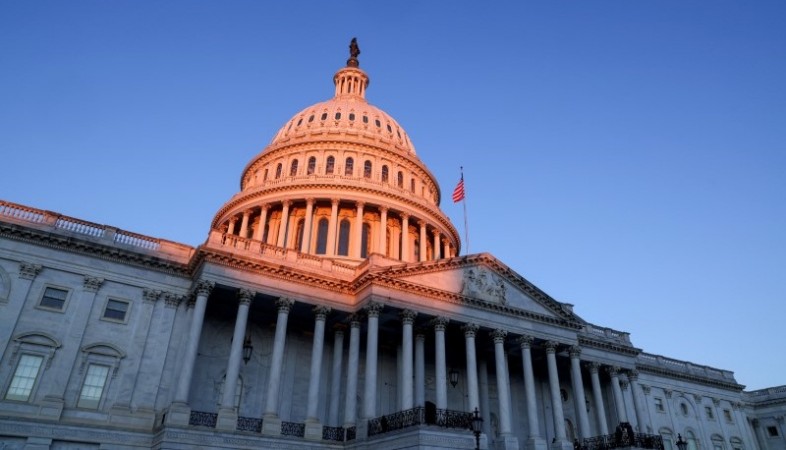
WASHINGTON: To prevent a disastrous default, the US Senate approved a package to avert the nation's debt ceiling until January 1, 2025. The law was approved on Thursday night in a 63-36 vote, one day after receiving support from 165 Democrats and 149 Republicans in the House of Representatives, as per reports.
President Joe Biden will now get the bill and sign it into law.On Friday at 7 p.m., the President intends to address the country. The debt ceiling, which the US Congress sets as a spending cap, governs the amount of money the government may borrow. By June, if it hasn't been increased above the existing maximum of around $31.4 trillion, the US may default on its debt.
A default would restrict the government's capacity to borrow more money or pay all of its debts. It also poses a potential to cause mayhem abroad by impacting global pricing and mortgage rates.
The bill was approved during the session on Thursday night with the support of two independents, 44 Democrats, and 17 Republicans.
In a 100-seat chamber that Democrats barely control, the bill needed 60 votes to pass. Thirty-one Republicans opposed it, including John Barrasso, a member of the party's in-house leadership.
Left-leaning senators Elizabeth Warren, John Fetterman, and Bernie Sanders were among the four Democrats who dissented. 11 modifications to the debt ceiling bill were initially presented by senators, but they were all swiftly rejected, clearing the path for a final vote.
The entire bill would have had to be sent back to the House if even one of the revisions had been approved, giving lawmakers little time to assure ultimate passage of the measure before the US went over the fiscal cliff.
Democratic Senate Majority Leader Chuck Schumer told the Senate, "America can breathe a sigh of relief, a sigh of relief because in this process we are avoiding default." "We avoided a disastrous default that would have destroyed our economy and caused unimaginable suffering to families. The majority of the historical investments we made were kept by us. The worst elements of the MAGA Republican plan that would have harmed families were removed from consideration, he tweeted.
We won't default and we won't agree to their radical plan. Good news for families and our economy. Mitch McConnell, the leader of the Senate Republicans, called for "ending the era of the omnibus and getting Washington back to work" in a rare show of bipartisanship.
President Biden also posted on Twitter, saying: "Senators from both parties just voted to defend our hard-earned economic gains and stop the first-ever default. "No one ever gets all they want during negotiations, but there is no denying that this bipartisan deal is a significant victory for the American people and our economy. "Our work is far from done, but I look forward to announcing tomorrow (Friday) that this bill has been signed into law as soon as possible." The prospect of default is eliminated until after the presidential election thanks to the suspension of the debt limit through 2025, according to reports.
The package also raises the job requirements for some food assistance beneficiaries and claws back some Covid-19 relief funding, among other policy features, in addition to addressing the debt ceiling. Over the weekend, the White House and House Republicans revealed their bipartisan debt limit agreement.
The US Senate Debt Ceiling Bill refers to legislation proposed and debated in the United States Senate to address the country's debt ceiling, which is the maximum amount of debt that the US government can legally borrow. The debt ceiling is set by Congress and serves as a limit on the amount of outstanding debt the government can have.
When the government approaches the debt ceiling, it means that it has reached its borrowing limit, and it cannot issue new debt to meet its financial obligations. This situation can lead to significant consequences, including a potential government shutdown, default on debt payments, and disruption in the functioning of various government programs and services.
The US Senate Debt Ceiling Bill is introduced to authorize an increase in the debt limit, allowing the government to continue borrowing funds to meet its financial obligations. This bill is subject to rigorous debate and voting procedures within the Senate, where senators express their opinions, propose amendments, and negotiate the terms of the increase.
The passage of a Debt Ceiling Bill in the Senate requires a majority vote, and if successful, it moves on to the House of Representatives for further consideration and approval. Both chambers of Congress must agree on the final bill before it can be sent to the President for signature into law.
Debt ceiling debates and negotiations are often politically contentious, as they involve discussions about government spending, fiscal responsibility, and the long-term implications of the country's debt. These discussions can sometimes lead to partisan disagreements and delays in reaching a resolution.
The US Senate Debt Ceiling Bill plays a crucial role in managing the nation's finances and ensuring the government can meet its financial obligations. It is a critical piece of legislation that impacts the stability of the economy, financial markets, and the overall functioning of the US government.